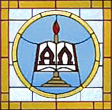 |

|
 |
Study 5: The Kingdom of God Defining The Kingdom | The Kingdom Is Not Now Established | The Kingdom Of God In The Past | The Kingdom Of God In The Future | The Millennium | Digressions (The Literality of the Kingdom, Summary of the History of Israel) | Questions |
5.1 Defining The KingdomOur previous studies have shown that it is God's purpose to reward His faithful people with eternal life at the return of Christ. This eternal life will be spent on earth; God's repeated promises concerning this never imply that the faithful will go to heaven. "The Gospel (good news) of the kingdom of God" (Matt. 4:23) was preached to Abraham in the form of God's promises concerning eternal life on earth (Gal. 3:8). The "kingdom of God" is therefore the time after Christ's return when these promises will be fulfilled. Whilst God is ultimately the King of His entire creation even now, He has given man freewill to rule the world and his own life as he wishes. Thus at present the world is comprised of "the kingdom of men" (Dan. 4:17). At Christ's return, "the kingdoms of this world (will) become the kingdoms of our Lord, and of his Christ; and he shall reign for ever and ever" (Rev. 11:15). Then God's will and desires will be completely and openly performed in this earth. Hence Jesus' command for us to pray: "Thy kingdom come (that) Thy will be done in earth, as it is (now) in heaven" (Matt. 6:10). Because of this, the "kingdom of God" is a phrase interchangeable with "the kingdom of heaven" (Matt. 13:11 cp. Mark 4:11). Note that we never read of 'the kingdom in heaven'; it is the kingdom of heaven which will be established by Christ on earth at his return. As God's will is completely obeyed by the angels in heaven (Ps. 103:19-21), so it will be in the future kingdom of God, when the earth will only be inhabited by the righteous, who will then be "equal unto the angels" (Luke 20:36). Entering the kingdom of God at Christ's return is therefore the end result of all our Christian endeavour in this life (Matt. 25:34; Acts 14:22); as such, it is absolutely vital to have a correct understanding of it. Philip's preaching of "Christ" is defined as teaching "the things concerning the kingdom of God and the name of Jesus Christ" (Acts 8:5,12). Passage upon passage remind us of how "the kingdom of God" was the main burden of Paul's preaching (Acts 19:8; 20:25; 28:23,31). It is therefore of paramount importance that we fully understand the doctrine of the Kingdom of God, seeing that it forms a vital part of the Gospel message. "We must through much tribulation enter into the kingdom of God" (Acts 4:22); it is the light at the end of the tunnel of this life, and therefore the motivation to make the sacrifices which the true Christian life involves. Nebuchadnezzar, king of Babylon, wanted to know the world's future (see Dan. 2). He was given a vision of a great statue, composed of different metals. Daniel interpreted the head of gold as representing the king of Babylon (Dan. 2:38). After him there was to come a succession of major empires in the area around Israel, to be concluded by a situation in which "as the toes of the feet were part of iron, and part of clay, so the kingdom shall be partly strong, and partly broken" (Dan. 2:42). The present balance of power in the world is split between many nations, some strong and some weak. Daniel then saw a little stone hit the image on the feet, destroying it, and itself growing into a great mountain which filled the whole earth (Dan. 2:34,35). This stone represented Jesus (Matt. 21:42; Acts 4:11; Eph. 2:20; 1 Peter 2:4-8). The "mountain" which He will create all over the earth represents the everlasting Kingdom of God, which will be established at his second coming. This prophecy is in itself proof that the kingdom will be on earth, not in heaven. That the kingdom will only be fully established in reality upon Christ's return is a theme of other passages. Paul speaks of Jesus judging the living and dead "at his appearing and his kingdom" (2 Tim. 4:1). Micah 4:1 picks up Daniel's idea of God's kingdom being like a huge mountain: "In the last days it shall come to pass, that the mountain of the house of the Lord shall be established"; there then follows a description of what this kingdom will be like on the earth (Mic. 4:1-4). God will give Jesus the throne of David in Jerusalem: "He shall reign...for ever, and of his kingdom there shall be no end" (Luke 1:32,33). This necessitates there being a certain point at which Jesus begins to reign on David's throne, and his kingdom begins. This will be at Christ's return. "Of his kingdom there shall be no end" connects with Dan. 2:44: "The God of heaven (shall) set up a kingdom which shall never be destroyed: (it) shall not be left to other people". Rev. 11:15 uses similar language in describing how that at the second coming, "The kingdoms of this world are become the kingdoms of our Lord and of his Christ; and he shall reign for ever and ever". Again, there must be a specific time when Christ's kingdom and reign begins on earth; this will be at His return. |